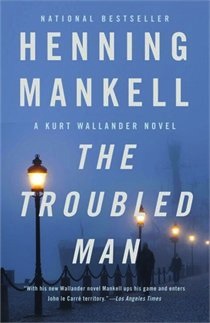 In 2012, Swedish writer Henning Mankell brought to a close his 12-book series on inspector Kurt Wallander. Actually, he concluded the series in 2009, but it took a couple more years to reach America. For that, Mankell used English academic Laurie Thompson, who translated three other books in the series, including the best one, “The White Lioness,” as well as about five other Mankell books. Thompson also translates the excellent Inspector Van Veeteren series from Hakan Nesser.
In 2012, Swedish writer Henning Mankell brought to a close his 12-book series on inspector Kurt Wallander. Actually, he concluded the series in 2009, but it took a couple more years to reach America. For that, Mankell used English academic Laurie Thompson, who translated three other books in the series, including the best one, “The White Lioness,” as well as about five other Mankell books. Thompson also translates the excellent Inspector Van Veeteren series from Hakan Nesser.
I had read about “The Troubled Man” well before it was published in April 2012 in America under the Vintage Black Lizard imprint (responsible for nearly all Mankell books). I had learned that this would be the final Wallander book, and that though Wallander wouldn’t die, it would be obvious why he couldn’t continue doing what he did. It became apparent very early in “The Troubled Man” what the issue would be, and Wallander struggles with it throughout the book even as he plods through his final case.
The case involves a retired naval officer who disappears, but only after a cryptic conversation with Wallander. The officer is the father-in-law of Wallander’s daughter, Linda, thus the connection. Wallander becomes embroiled, on his own time, in determining what happened to the man. There is a spy, Cold War theme.
The book moves along slowly, much more so than other Wallander books. But there’s a reason. A lot of things are happening, and they are happening with exceptional care under Mankell’s pen. This may be his most literate book, the most tenderly written, as he bids goodbye to his hero. There are references to earlier books, previous cases, including a final disposition of his long-distance Latvian soulmate, Baiba Leipa, which traces back to the second book, “The Dogs of Riga.”
Yes, it’s a slow book. The main plot doesn’t involve a whole lot of action. But I was entranced, finding myself clearly in the hands of a master writer who was intent on doing justice to the character he had created and nurtured so well. I didn’t care how slowly the story moved. I was soaking it all up.
The plot resolution was not unexpected, though it kept me guessing. However, the book continued well after the case was settled, as Mankell ties up loose ends in Wallander’s life. And the final paragraph, and especially the final sentence, close the story–close this life I’ve come to know so well–with dignity and grace. It was a totally, completely satisfying ending.
The Wallander books were among the first books I read in the Black Lizard imprint, which I’ve come to love. I’ve read 14 Mankell books now, including all 12 Wallander books. “The Troubled Man” was a milestone for me, the 150th Black Lizard book I’ve read. I saved this book for number 150, knowing it would be special. It seemed appropriate.


 In 2012, Swedish writer Henning Mankell brought to a close his 12-book series on inspector Kurt Wallander. Actually, he concluded the series in 2009, but it took a couple more years to reach America. For that, Mankell used English academic Laurie Thompson, who translated three other books in the series, including the best one, “The White Lioness,” as well as about five other Mankell books. Thompson also translates the excellent Inspector Van Veeteren series from Hakan Nesser.
In 2012, Swedish writer Henning Mankell brought to a close his 12-book series on inspector Kurt Wallander. Actually, he concluded the series in 2009, but it took a couple more years to reach America. For that, Mankell used English academic Laurie Thompson, who translated three other books in the series, including the best one, “The White Lioness,” as well as about five other Mankell books. Thompson also translates the excellent Inspector Van Veeteren series from Hakan Nesser.


